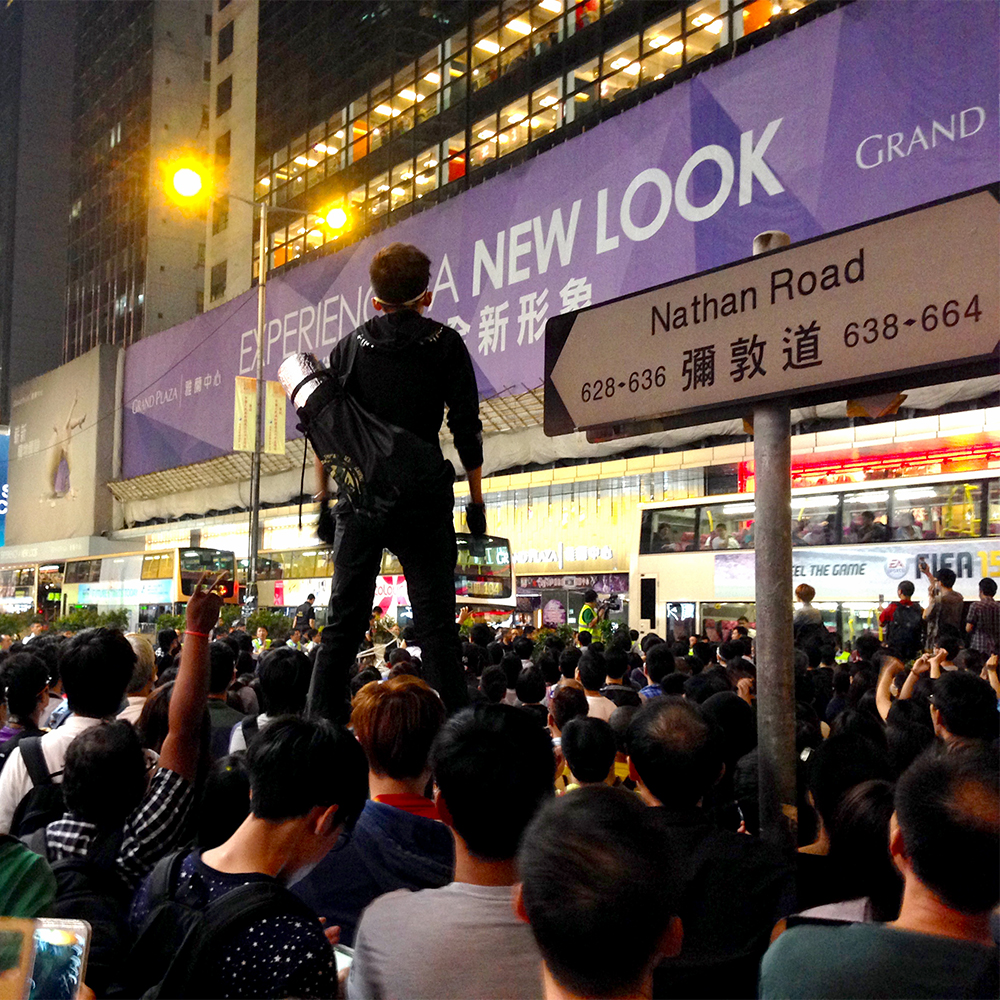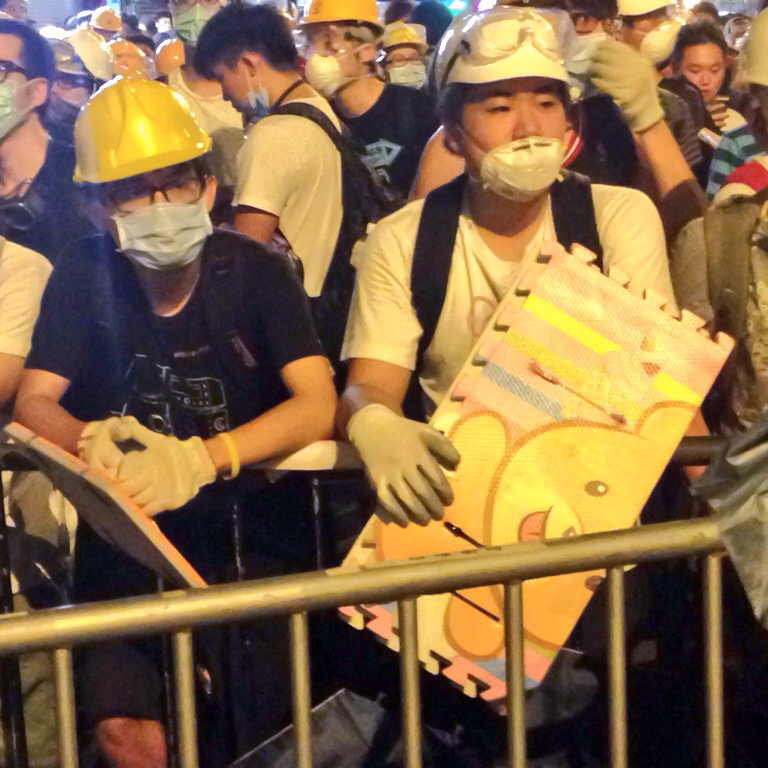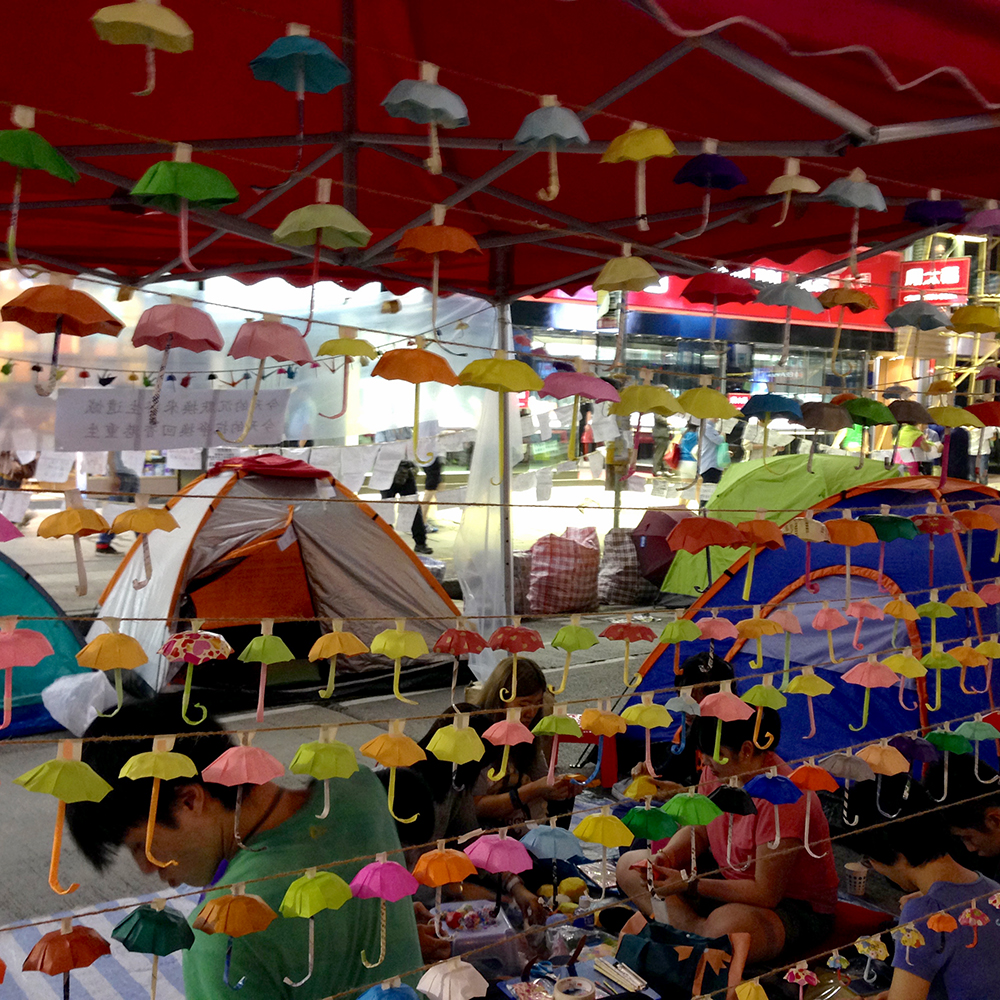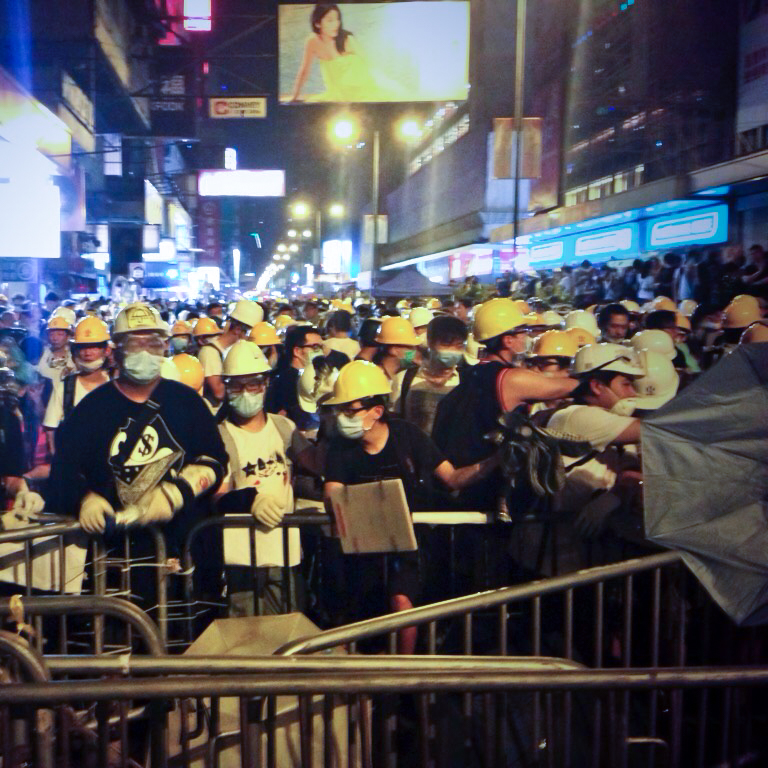Below is the latest in an ongoing series of the author’s reports from Hong Kong.
By Erik Wennermark
The scene on Queensway near Lippo Centre on the afternoon of Monday, October 13th is like the strata of the earth. In the shadow of Ruth’s Chris steakhouse, a layer of Blue-Ribbons—anti-Occupy protesters—are mashed against a layer of police; there follows a layer of flashing photographers and camera operators, the flounce of an umbrella, a thin strip of steel, and finally, the Occupiers. Many hundreds watch from a nearby overpass, a parking garage, or the windows of their office buildings. The odd geology is the result of an earlier confrontation between Occupiers and marching Blue-Ribbons following the removal of several barricades that morning. There is more talk of conspiracy, of police-triad-Blue-Ribbon collusion. Whenever police dismantle Occupy-built barricades, Blue-Ribbons inevitably follow in an attempt to permanently reclaim the street. This is a pattern that will repeat itself many times over the next few days.
The cops are linked together arm-in-arm or holding hands, trying to create a cordon to funnel the Blue-Ribbons away from the protesters. Punches are thrown over police shoulders and wrists: wild, flailing blows hoping to land on an Occupier’s chin or cheek. A fat man in his forties wearing fashionable business casual—Armani Express—is screaming at a young man wearing a septum ring, pony tail, and large-gauge plugs in his earlobes. The younger man says nothing, but returns perhaps the iciest glare I have ever seen.
At 5 a.m. Tuesday morning, police rip Causeway Bay in half. The art installations and barricades in front of Hysan Place are easily swept away. The mobile democracy classroom and library dismantled and tossed in dumpsters; what protesters manage to save wheeled off in carts. The midnight tutoring sessions have come to an end. There are several hundred police and perhaps fifty protesters. Kept from the scene, I circumnavigate, seeking ingress. In my journey, I count at least thirty police vans and see dozens of motorcycle cops. As the police dismantle the barricades, two young girls wearing hoodies—it is autumn now—and facemasks, sweep up the plastic ties the cops throw to the ground. A young man mechanically sticks flyers to the doomed barricades and lets out a repetitive, anguished keening.
“We will give you nothing,” the government tells the Occupiers, “and you will do nothing about it.”
Just hours before the site is raided by police I meet Raymond, a fifty-seven-year-old IT professional and martial artist. “I feel ashamed,” he says, sadness creasing the lines of his face with a shaky timbre to his voice. “It was my responsibility to give them a free and healthy society. I failed to give them something better, and now they are doing it for me.” After the raid, Raymond’s last words to me are somewhat comforting: “These young people have learned a lesson about freedom and democracy. If the police reclaim the street, it doesn’t matter. [The students] will come back the next day, the next week.”
In an article in the New York Times, Keith Bradsher and Chris Buckley report that Hong Kong’s leaders make a daily run to the tony Bauhinia Villa Resort in nearby Shenzhen to receive supervision and direction on responding to Occupy from their Chinese Communist Party (CCP) functionaries. While the relative splendor of their accommodations is not surprising, the details of white vans, tennis courts, and swimming pools reinforce the image of Hong Kong’s leadership being completely dependent on Beijing. The CCP’s main dicta—no concessions and no bloodshed—are seemingly contradictory goals, particularly as protesters grow more hardened by the occupation. “We will give you nothing,” the government tells the Occupiers, “and you will do nothing about it.”
Toward midnight on the 14th, Lung Wo Road, a harborside drag by the Government offices, is reoccupied in great numbers. The police are forced to retreat after failing to regain control of the area. They do not appreciate this embarrassment and when they return a few hours later they are no longer fucking around. The police make forty-five arrests and their batons, fists, and feet fly liberally. There are dozens of pictures and videos online: police ripping off a man’s goggles to pepper-spray his eyes; teenage girls tackled to the ground. Worst, though, is the video of a handcuffed man being carried to a dark corner of Tamar Park, across from the Executive Offices, where he is then punched and kicked for several minutes. As the video spreads, Hong Kong is aghast that any of its police could behave in such a way.
Ken Tsang, a volunteer social worker and Civic Party member is identified as the man in the video. Ironically, unlike other Hong Kong people, Tsang’s élite position on the Chief Executive Nominating Committee gives him the power to vote. In a South China Morning Post article on low morale and fatigue among the police, Joe Chan, a member of the Junior Police Officers’ Association, is quoted saying, “We start to be unable to distinguish right and wrong.” Police contend that the protesters are acting illegally by pitching tents in the middle of the highway and should have been forced off the street immediately. The politicians are simply not letting Hong Kong’s reputedly adept cops do their jobs. Like petulant children they are further irritated when their steel barricades are taken and used against them. For their part, Occupy leaders have promised to turn themselves in to police at the event’s conclusion, whenever that might be.
Wednesday night by 9 p.m., perhaps a thousand fill the street in front of Wan Chai Police Headquarters. Blown up photographs of Ken Tsang’s bruised and scratched body are stuck on placards. Netizens have combed through the footage and found clearer pictures of the officers responsible. Protesters distribute old-fashioned wanted posters identifying the cops in the video.
A young married couple, Brian and Foie, are sitting on a tarp with a few others making origami umbrellas in Causeway Bay. Foie likes this site better than Mong Kok (too much profanity) or Admiralty (too many people). They are unimpressed with CY Leung’s press conference that afternoon, in which he announced upcoming talks with members of the Hong Kong Federation of Students (HKFS). “So much bullshit. It made me sick,” says Brian, a computer programmer who watched on the internet from work. “He’s in between. He doesn’t want to upset the people, but he has no power to override the Basic Law.” Brian is pessimistic about the present situation, but hopes for long-term change.
The students want not only an open election, but an open nomination process. They do not feel a committee of 1,200 elites is “broadly representive.”
The leaders in Admiralty seem to agree with Brian’s assessment. In their speeches that night, little time is devoted to the talks—perhaps they will wait for them to actually begin, if they ever do. More words are spent on the increasing antagonism towards the police. Joshua Wong, older than his eighteen years, asks the crowd, “Should we see the police as a tool to vent our anger? This is a question each of us here should think about.”
The Basic Law is essentially Hong Kong’s constitution. It was written in cooperation with authorities in Beijing following the Sino-British Joint Declaration leading up to the British handover of the city to the Chinese in 1997. It provides the legal basis for Hong Kong’s unique “one country, two systems” relationship with the rest of China and is open to seemingly endless interpretation. One of the main areas of contention, election of the Chief Executive, is dealt with in Article 45: “The ultimate aim is the selection of the Chief Executive by universal suffrage upon nomination by a broadly representative nominating committee in accordance with democratic procedures.” It continues, “The method for selecting the Chief Executive shall be specified in the light of the actual situation and in accordance with the principle of gradual and orderly progress.”
The students want not only an open election, but an open nomination process. They do not feel a committee of 1,200 elites is “broadly representive,” a fact that should be reflected “in light of the actual situation.” However, with the “ultimate aim” of “gradual and orderly progress” the status quo is easily sustained. According to the initial agreement, Hong Kong, as a Special Administrative Region of China, is promised fifty years of rights and privileges not seen anywhere on the Mainland: a free press, free speech, and an independent judiciary. Hong Kong people have come to value their rights and are not eager to give them up or have them encroached upon.
For the third time this week, the police launch a dawn raid to clear barricades, this time in Mong Kok. Within an hour, the most vivacious of the three sites is shrunk to the size of its cohort in Causeway Bay. At the time, there is surprisingly little resistance, but numbers swell throughout the morning and into the afternoon.
Despite the mayhem, supplies are being passed overhead: gloves, umbrellas, masks, and now hard hats. The police are not being picky about the destination of their batons and many head injuries will come tonight.
At 7 p.m., when I arrive, Anti-Occupy leaflets fall from the windows of the twenty-plus story apartment buildings looming over Nathan Road. Around twenty percent of the original protest site remains and the area is packed to overflowing; the surrounding sidewalk is like the front row of a hard-rock show. The sole mission of the police seems to be to keep a slow stream of public buses moving down one open lane of Nathan Road. The mere whisper of a protester or onlooker impeding that goal results in arrest and a scrum of photographers in the street bringing the crawling buses to a halt. Some passengers on the double-decker buses wave and many take pictures while the crowd cheers. The cops are wearing full helmets and carrying riot shields, many with an I-didn’t-sign-up-for-this-shit look peering through their plastic facemasks. The crowd—people of every age, sex, and description—is growing larger by the minute and every corner of the intersection of Argyle Street and Nathan Road is jammed; it is quite impossible to keep to the sidewalk. When a white policeman walks by—one of the remaining British-holdovers—the crowd enthusiastically chants, “Fuck you! Fuck you!” in English, dozens of middle fingers raised to the sky. “Black Cops! Black Cops follows in Chinese. As CY Leung said, Mong Kok “is not exactly the most genteel” part of the city.
It is exceedingly difficult to get any idea of the bigger picture stuck within this mass, but someone is pushed, someone trips, something happens, and the red flags and umbrellas are raised. When I see the first shaving cream-like glob of pepper spray land on a nearby protester I back up quickly but am unable to get far through the throng of terrified people, many hundreds of whom are clearly curious pedestrians out on a Friday night. An old man next to me is flushing a boy’s face with water from one of the five bottles he has stashed about his person. Despite the mayhem, supplies are being passed overhead: gloves, umbrellas, masks, and now hard hats. The police are not being picky about the destination of their batons and many head injuries will come tonight.
The initial fracas settles, but will continue in fits and starts until 3 a.m. Marco, a “working man,” is here to protect the students and is pepper-sprayed for his troubles; his face is red and his eyes run with tears even more than half an hour afterward. “We didn’t push them at all,” he tells me about the beginning. “They pushed us and we fell down and they sprayed us on the ground.” He questions the timing of the police operation, a concern that is repeated many times over the next days: the police were simply asking for trouble to clear this site at the beginning of a weekend. Some think they wanted the violence that ensued. Chris, a twenty-five year-old translator, tells me he’d much rather be home watching a movie, but the police have forced his hand. His manner of speaking reminds me of any young, brash, big-city American. He had some work translating for the major news organizations the previous week, but that has since dried up, “They [CNN, etc.] left, so now [the police] can kick our ass.”
After a Saturday of more violence and a Sunday of relative calm, Monday sees the release of stunningly audacious CY Leung quotes reported from a conversation with international press in his plush Executive quarters. He believes one-man one-vote would give the city’s relative poor disproportionate power to their limited influence. “If it’s entirely a numbers game and numeric representation,” Leung says, “then obviously you would be talking to half of the people in Hong Kong who earn less than $1,800 a month, then you would end up with that kind of politics and policies.” Basically, if the “poor” can vote, he and his cronies lose. He has since tried to expressed regret about those comments. I have never been able to muster the emnity many feel for the man, but my previous grudging respect evaporates at this brazen display. Leung always seemed like he was trying at least; he was doing his best for Hong Kong people in the face of the implacable force of China. Now he seems like just another rapacious Party functionary, looking out for himself and his real constituents.
I see other figures that put the percentage of Hong Kong people who make less than $1,800 a month (around HKD 14,000) at closer to seventy-five percent. A new group of protesters composed of housewives, domestic servants, and transportation workers wearing placards around their necks listing their occupation and salary, marches through Admiralty. Some familiar photos I saw earlier in the week displayed in Causeway Bay of Hong Kong’s caged people, unable to live in anything but a human pet store, take on a new, even grimmer, significance.
Occupy has expanded to reach so many facets of Hong Kong life. This is no longer about just a vote—though the Occupiers think, perhaps naively, that a vote would allow them to address these other, largely economic, concerns. Hong Kong is close to the top of the chart in income-inequality in the developed world (not far from the US); The city is run by billionaire tycoons thriving on favors and monopolies. Hong Kong people have long known this, but all of a sudden they’re talking about it. Everything they buy, every time they pay the rent or heat the water for a shower, every time they get on the bus, the powerful of the city become richer and more entrenched. New signs and slogans addressing these damning facts are seen across every Occupy battlefield.
During the talks between five members of HKFS and five counterparts in the government, I am engaged in a reading of The Tempest with a student who is not seeing the humor in the scene in which Trinculo and Caliban, snuggled under the gabardine, are mistaken for a four-legged monster by a plastered Stephano. “It’s funny, really! This was really popular in its day!” I ineffectually plead. By the accounts of Twitter and the live-blogs I quickly peruse afterwards, the students and government, while civil and even admirable to my eyes, have a similar failure in bridging the chasm that has expanded over three-plus weeks across this city. The negotiations are broadcast on the Mainland as well, but only the remarks of government representatives; the students’ voices are shut out.
Student leaders contend that it is within Hong Kong’s power to change the nominating system; the government disagrees. They bring up CY Leung’s offensive commentary about a new “second-class” of Hong Kong people; the government remains silent. In the end, the government agrees to submit a report to Beijing that reflects “new concerns,” but little else of substance is achieved. Nonetheless, I think the talk is a significant step. Many see the dialogue as one between credible equals. Despite the students’ t-shirts and jeans, the side representing Hong Kong’s future is clear. No second round is yet established.
In Causeway Bay, a large screen is still set up where everyone watched the event and the area is now given over to a series of people giving their reactions. Foie and Brian are making origami umbrellas with a group of friends; they are in the same place, doing the same thing as when I last saw them. Brian feels the same way he did when I spoke to him earlier in the week: the government is unable to change the Basic Law, will make no concessions, and will push things down the road indefinitely. The students made “many powerful statements,” he says, but the government wasn’t listening. I ask him how long people will stay in the streets. “I think it depends more on the weather and not the government. For me, one more week. The laundry and dust are higher every day.”
“We know this is illegal,” Carol, a thirty-year old speech pathologist, says of the continuing occupation. “I want it to end tomorrow, but we will keep doing everything [to get the message heard].” As for the debate she says the government simply gave pre-memorized speeches, “Why have talks if [the government] will just be video players? They ignore us and we are like babies crying for conversation.”
The next day in Mong Kok there is an incident of attempted arson on an Occupy supply station by an anti-Occupier. Torrential rain washes the street clean. Whether the Occupiers can withstand the deluge remains to be seen.
Erik Wennermark is a contributor who lives in Hong Kong. Follow him on Twitter.




